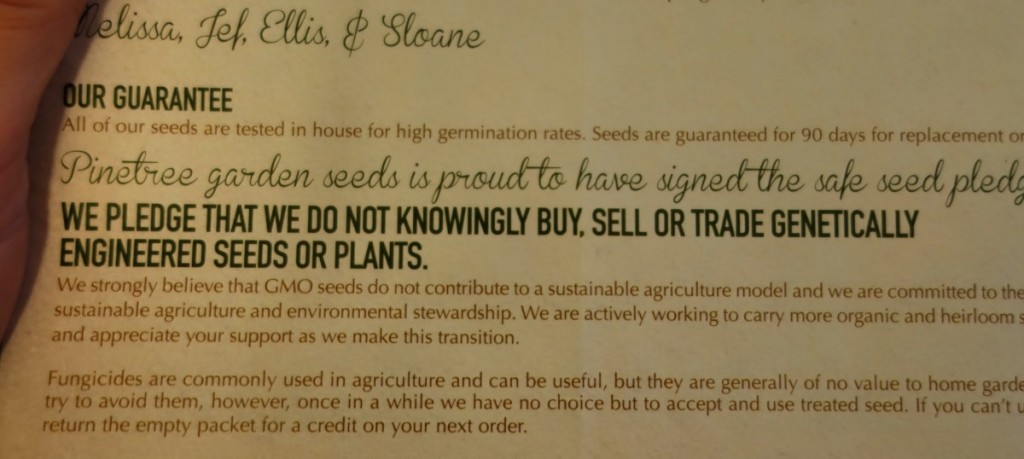The seed catalogs have started showing up in the mail, and a great number of them include something like this on the first few pages:
Here’s the thing: NO ONE is selling genetically engineered seeds to home gardeners. There is one company, funded by kickstarter, that is trying to sell genetically engineered seeds of a glow-in-the-dark plant sometime in the future (though, like a lot of kickstarter project, the actual release date keeps getting delayed) but other than that, genetically engineered varieties are only being sold to commercial farmers, and only after the farmer has signed a pretty comprehensive licensing agreement.
You can go to the store and buy food made from genetically engineered varieties — essentially anything that contains corn and isn’t labeled as organic will be — and you can stop by the pet store and pick yourself up a fish with jellyfish genes, but no one is trying to sell you genetically engineered seeds.
So those pledges in seed catalogs promising they contain no GMO seeds are technically true, but also pretty meaningless. So if you are worried about accidentally getting a GMO variety, don’t be. And if you wish you COULD grow one, sorry, you are out of luck, unless that kickstarter project ever actually gets up and running.
— Joseph Tychonievich

How long do you think this will be the case? Do you foresee a time anytime soon when seed companies will be selling GMO seeds?
I don’t, at least not anytime soon. Typically the traits of existing commercial transgenic GE varieties are not things home gardeners look for, and the home gardening seed market is just too small to justify new varieties.
That could change with advances in technology. For example, there are also cisgenic seeds, which use the same techniques as GE but use genes from the same species. These are labelled hybrids (because they *are*), but leverage these new techniques to producing better varieties faster. AFAIK, the only seed likely to end up in private gardens right now that is a cisgenic hybrid is a turf grass. But turf is a huge commercial market as well.
I think this will be the case for a long time. Getting a new GMO variety to market is VERY expensive, and I don’t think the home gardener market is big enough to make it worth while. Not to mention the significant PR backlash they would probably face. I think most companies working with genetic engineering would rather stay out of the public eye as much as possible rather than deal with the significant public opposition. Though I could be wrong: I would have never guessed the GMO pet fish would be both popular and apparently non-controversial, but they seem to be making money and I’ve never heard anyone getting mad about them.
Hope this calms some people down…but probably not. Thanks Joseph.
How did genetically engineered wheat seeds get out? They weren’t even approved for use but somehow found their way into fields.
While no one is SELLING GMO seeds, they still get out into the larger world. Once out there, they alter the genetic composition of the plant that has grown as a result. Thus, someone could be selling GMO altered seeds without their knowledge or desire to do so.
I think the purpose of the safe seed pledge is to ensure that seed companies are not doing business with gmo sellers. It is possible that even if seeds are non-gmo or organic, large gmo companies like Monsanto still benefit from sales, and that’s why conscious consumers follow the safe seed pledge. I think that this article fails to acknowledge financial ties between large companies and is actually misrepresentative and harmful. Please make educated purchases and investigate several sources for information.